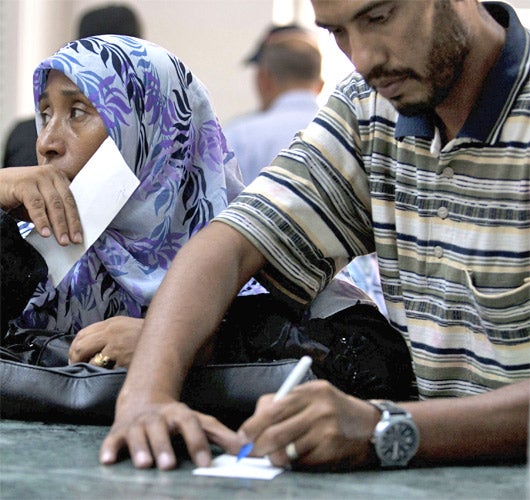Tempers flare in Tripoli as liquidity crisis hits before Eid

Your support helps us to tell the story
From reproductive rights to climate change to Big Tech, The Independent is on the ground when the story is developing. Whether it's investigating the financials of Elon Musk's pro-Trump PAC or producing our latest documentary, 'The A Word', which shines a light on the American women fighting for reproductive rights, we know how important it is to parse out the facts from the messaging.
At such a critical moment in US history, we need reporters on the ground. Your donation allows us to keep sending journalists to speak to both sides of the story.
The Independent is trusted by Americans across the entire political spectrum. And unlike many other quality news outlets, we choose not to lock Americans out of our reporting and analysis with paywalls. We believe quality journalism should be available to everyone, paid for by those who can afford it.
Your support makes all the difference.The queues stretched right around the block as Libyans waited in line to withdraw money from the bank before Eid, the festival marking the end of Ramadan, beginning in Tripoli today.
Squabbles were beginning to break out as tempers frayed in the heat and people, hungry from yet another day of fasting, waited to withdraw the 250 dinars (£125) they could access before the banks closed yesterday.
Karima Mohammed, 23, said she had been standing in line for more than four hours, as she waited outside a bank on Mohammed Al Megaraif Street. She didn't know if she would be able to withdraw cash that day. "I'm not sure if I'll get money or not. I'm worried," she said.
Libya has been beset by liquidity problems since the uprising began in mid-February. "Now nobody puts money in the bank because they are worried about the future," admitted Abdu Salam bin Zaid, 60, one of the managers of the National Commercial Bank in Martyrs' Square. "People are afraid to put money in the bank because they come back and they can't get it back any more," he said.
In an effort to instil confidence in the banking sector, the UN agreed yesterday to unfreeze nearly £1bn worth of Libyan currency held in the UK, a move which the Foreign Secretary William Hague said would "help address urgent humanitarian needs".
The frustration of many Libyans was evident yesterday. In the hall downstairs at the bank there were scenes of pandemonium as people desperately tried to cash their 250 dinar cheques.
A poster of the rebel flag was freshly taped to the wall while a photo of Colonel Gaddafi lay torn in half on the floor, next to the elaborate gold frame in which it had once been held.
Khireya Khalil, 60, a divorced mother of eight, had not been able to withdraw money that day. "My salary is 500 dinars a month but I came here and they said there is no money in my account," she said. "This is my salary, I have no other way to get money.
"They have to find a solution now because it's the end of Ramadan and everything is very expensive: clothes, vegetables, water," she explained. "The price of a kilo of meat is 30 dinars now (around £15), one litre of milk is four dinars, one kilo of tomatoes is 6 dinars. It's crazy prices."
Mrs Khalil's daughter, Ibtisam Mohammed, 35, had been able to withdraw the 250 dinars of social security benefits that, as a divorced single mother, she receives every month from the government, but said she needed more. "It's not enough," she said. "We've had no water for 10 days."
Hamza Tahir, 30, was one the guards outside a bank near Martyrs' Square. "It was crazy when we started to reopen the banks but now it's under control. We are trying, it's not too good, but we're trying," he said.
"I have more than 15,000 dinars in my house," admitted Louai Ghanimi, 35, as he drove along the Tripoli waterfront. An English-speaking employee of an oil company in Libya, he said he rarely deposited money in the bank. "We do it deliberately, so the regime cannot use this money. Some people I know are businessmen and they have millions hidden in their homes, under the tiles."
Despite the shortages, shops are reopening in the capital. On Rashid Street, in the centre of town, there were rows of stalls selling sunglasses and shops displaying clothes, watches and computer equipment. "I have to reopen my shop," said Hamza Ali, 25, inside a kiosk selling mobile phones. "It's safe now, there are no snipers."
Yesterday afternoon, Abdul Majid al Sidiq, 51, was at the end of the long queue to withdraw money from the bank on Mohammed Al Megaraif Street. "We trust the people of the National Transitional Council," he said. "Since they liberated here, everything has changed. We have 50 dinars of credit put on our mobile phones so I think they are good people. We have to wait. We haven't finished the revolution yet."
Join our commenting forum
Join thought-provoking conversations, follow other Independent readers and see their replies
Comments